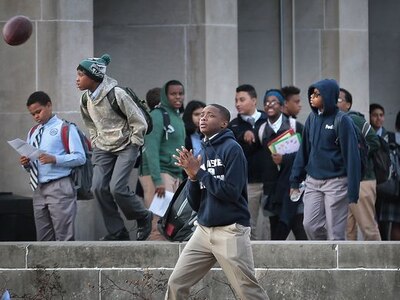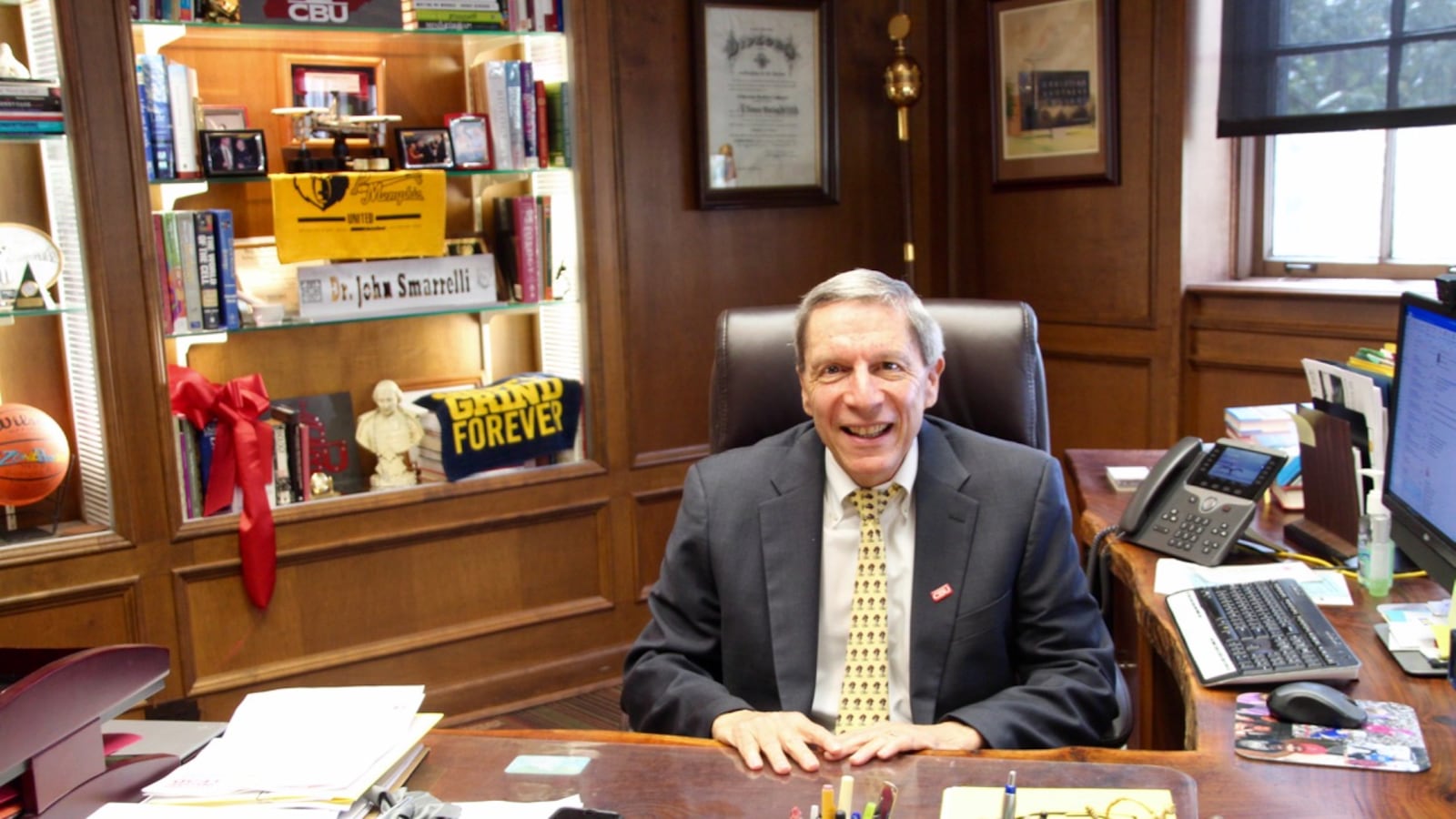John Smarrelli has been building a career in higher education since 1971.
Now the 22nd president of Christian Brothers University — a private Lasallian Catholic college in the middle of Memphis — Smarrelli sees his new work in the K-12 charter sector as explicitly connected to his role as a university leader.
“There’s too much remediation going on for our college students,” Smarrelli said. “I guess you can say I realized my call, that part of my responsibility is to help create better environments so our pre-K through 12th-grade students are ready for college if that’s what they choose.”
Smarrelli is the board chair of two Memphis charter organizations — Crosstown High, which is set to open this fall, and New Day Schools, a new organization attempting to convert the sites of nine private Catholic schools into charters after the Catholic Diocese of Memphis announced it would close the schools following the 2018-19 school year.
Smarrelli told Chalkbeat that his work in shepherding the charter schools has been “nourishing,” and that he hopes to focus his time more intently on what nourishes him in the future. After almost a decade in charge of CBU, Smarrelli said that he has reached out to the university’s board members on starting a search for his successor.
“I told the board, 10 years is probably enough,” he said.
“That’s the way most good corporations do leadership. I want us to start looking for a successor, someone who shares my vision, someone who could succeed me and work with me for a little bit of time. I’m ready to walk away and whatever the next thing is — be it charters or something else — it will happen in time.”
Smarrelli took the helm of Christian Brothers University in 2009. During his tenure, CBU has launched a massive $70 million master plan, including the construction of a new education building, partnered with a popular district-run middle school and high school, and pledged $12 million over seven years to expand a program focused on the success of undocumented students.
We sat down with Smarrelli to talk about the future of charter schools in Memphis, the debate surrounding the Deferred Action for Childhood Arrivals, or DACA, which protects undocumented immigrants who came to the U.S. as children from deportation, and his next steps. Federal courts so far have blocked the Trump administration from ending the program.
This Q&A has been lightly edited and condensed for clarity.
In your spare time, you are the board chair of two charter organizations. Give us an update on both Crosstown High and New Day Schools.
On Crosstown, we’ve knocked it out of the park. For our first class this fall, we’re expecting 150 to 160 freshmen. The only concern we’ve got as a board is making sure that diversity is there. From day one, we want this to be a diverse school. With charter schools, you have to do a lottery system. We have to do a good job of marketing the school to diverse populations in Memphis, so that the school will be racially and socioeconomically varied.
On New Day Schools, we’ve submitted our chater applications for nine schools to Shelby County Schools. We’ll probably get rejected on our initial application to the district, but there will be a time period for us to address concerns and resubmit. Right now, we’re working on negotiations with the Diocese of Memphis to create a great rental agreement for the different buildings. We’ve got to get the buildings at an affordable cost so we can continue to run the schools and invest in quality education.
How will CBU get involved with the charter schools?
We’re still working out the final details, but we view Crosstown High as an opportunity to train urban teachers in a different way with a focus on project-based learning. At Crosstown, the idea of a traditional classroom is dead. There’s this openness to the school, and projects are the focus of curriculum.

This is an opportunity to make teaching exciting and innovative, which is significant because we know burnout for good, urban teachers is so high.How can we create an environment where teachers love teaching in an urban setting and don’t feel they are just teaching to a test? That’s the answer we’re looking for at these schools for CBU students in education.
At the New Day Schools that we’ll hopefully have in the future, CBU’s role as a Catholic university will help make it to where we can do religious programming before or after school. Obviously, as a public charter school, we can’t keep the religious aspect during the school day. But a lot of parents choose these schools because they were affiliated with a faith organization, and in talking with parents, that’s something they want to see continued in some way.
What role do you see charter schools playing in the Memphis education landscape?
Memphis is a poor community What’s the bridge out of poverty? It’s education. There’s no other way out. So, if we can create a really great environment for these students to get educated and to see the value of education, then I believe we’ll see Memphis change in incredible ways.
I’ve seen a renaissance in education in Memphis over the past four to five years in terms of innovation in the pre-K through 12th-grade space — through charter schools and some of the district schools we partner with — and I wanted our university and me as an individual to be a part of that change.
CBU has actively recruited undocumented students and partnered with foundations to help support their tuition. Under the current political climate, there is a lot of uncertainty around what will happen to students and individuals protected by DACA. How has CBU worked with students during this time?
It’s been important to me that our DACA students become integrated in every part of our campus, and they have really done so. I just applaud those efforts, because they understand that they are part of a faith and service community at this campus. They are part of this community. They haven’t retreated from campus life, which would have been very understandable during this time where they are genuinely afraid for their lives and their families. What they’ve done is they have infiltrated everything that we do, and that makes my job a lot easier, because there’s dialogue that’s happening that I don’t have to facilitate. They are in fact facilitating it themselves.
This is such a hard time for our students. What we’ve tried to do is listen to them, to know their concerns and to be there for them. We’ve brought in immigration lawyers to talk with students. We’re also trying to assure our students as much as possible that we care about them and will do everything we can to protect them.
What do you see as your role in the dialogue around the future of DACA?
In terms of my own role, I need to be an advocate at the political level.
So I’m constantly on social media, whatever I can do to communicate to our students and say: I’m with your state senators, or I’m sitting down with The Washington Post, or I’m in Washington D.C trying to be your political advocate and make a legislative change. I keep thinking we’ve got a legal path forward for these kids, but then we keep going backward.
What scares me the most is that we won’t have a solution. Our DACA students are performing at grade level or above in our classrooms. What I want most is a permanent path so they can be great contributing members of society — whether if that’s citizenship or a permanent legal status. Just get something with the word permanent in there. You know, these students love this country. We can worry about the walls and other politics later, we can’t keep holding 800,000 kids hostage.
You mentioned you are considering retirement from CBU in the near future. What do you think could be next for you?
I’m excited at the prospect of spending more time as a grandfather and doing some of the other things that this job doesn’t always offer you a chance to do. My next phase in life is going to be about balance. And I’m looking forward to it, especially knowing the work we’ve done here at CBU to propel students from marginalized communities into jobs and positions where they can change their worlds.

